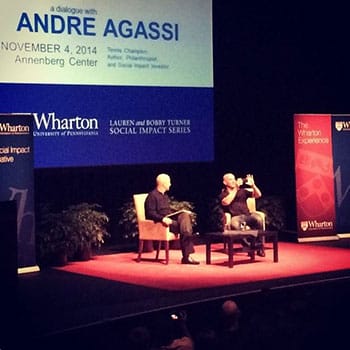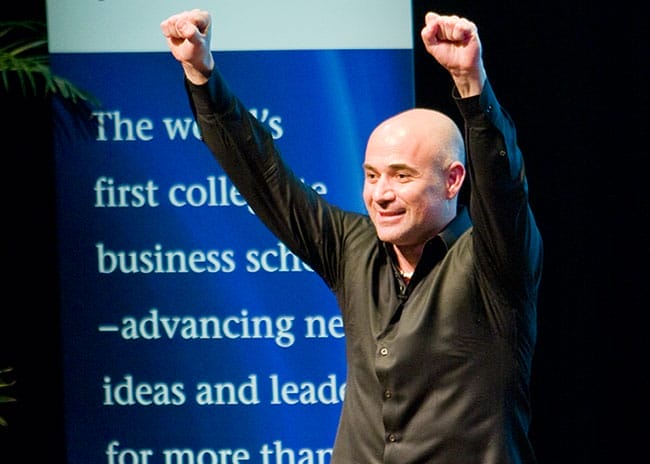As Bobby Turner, W’84, explained, there isn’t a magazine called Social Impact just yet—not in print, and especially not in iPad, Android or Kindle versions. So when University of Pennsylvania students want to find out more about their exciting, growing field, one of their best ways to do so is to listen to practitioners—better yet, pioneers—like Turner, who has excelled at using market forces to revolutionize how urban development, schooling and other societal problems are tackled as CEO of Turner Impact Capital LLC.
It’s the reason why Turner and wife Lauren Golub Turner, W’85, endowed the semiannual Lauren & Bobby Turner Social Impact Executive Speaker Series in 2010.
What you get from the series are intimate discussions with brand-name celebrities like Eva Longoria and Ashton Kuchner (see the video below). What you get from Turner during these talks are his strong views of the power of social impact, as well as very intriguing ways to look at and define “social impact.” It’s a term that leaves people scratching their heads at times.
As Turner told the audience at the fall 2014 lecture, people continue to ask him, “What is social impact?”

Bobby Turner, W’84, and Andre Agassi taking a picture of the Penn audience during the Lauren & Bobby Turner Social Impact Executive Speaker Series event.
One way to look at it, he continued, is as a “new risk management filter” for all companies. The importance of reputation and the risk to company reputations are at a zenith, attributed by Turner, to evolving social values, consumer activism and social media. He advised the audience to think of social impact as akin to climate change in the convergence of forces that make it relevant to nearly all a company does.
Another interesting lens through which to view social impact is in contrast to philanthropy. Turner “evolved” from treating a problem through philanthropy, he said, to trying to solve problems through social impact as a conscientious investor and organizer.
“If you really want to solve a problem in society, you need to harness market forces,” he explains—which perhaps encapsulates the difference between charity and social impact.
The difference is significant. As explained Turner’s guest speaker this go-around—tennis legend Andre Agassi, who also served as the inaugural Turner Social Impact Executive Speaker guest—it was “risky” for him to join Turner.
Watch video footage from the Turner Social Impact Executive Speaker Series interview with Ashton Kushner.
Agassi explained that he had spent his life as a philanthropist, and essentially Turner asked him to go into the “for-profit space” and start “monetizing” philanthropy. Did that go against everything he had stood for?
But if it works, how could Agassi say no to benefiting thousands of underprivileged students in a sustainable—important word there, “sustainable”—way?
The two gentlemen partnered to create the Turner Agassi Charter School Fund, a social impact private equity fund that has funded 39 schools and 18,000 seats for children.
They are part of a fast-growing trend. Total U.S.-domiciled assets categorized as sustainable, responsible and impact investing (SRI) reached $6.57 trillion at the start of 2014, up from $3.74 trillion in 2012, according to the Forum for Sustainable and Responsible Investment.
For Agassi, social impact has become a new way for him to express his dreams—indeed, change the landscape of education—in a way that was unthinkable until Turner showed up.
It’s an interesting and perhaps controversial view—philanthropy as antithetical or subverted or inferior to social impact. What are your thoughts on social impact? Please share them below.
























